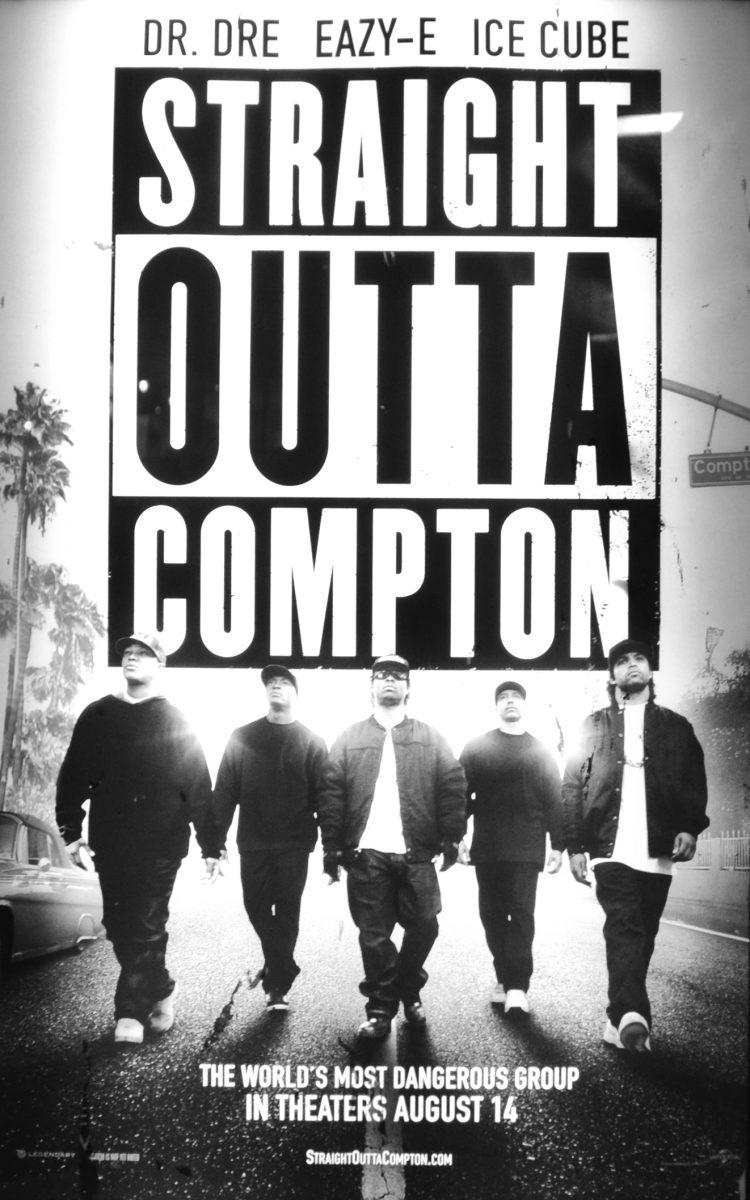Straight Outta Compton
F. Gary Gray
Legendary Pictures
4.5 out of 5 stars
Much like John Singleton’s “Boyz N The Hood,” “Straight Outta Compton” opens with the sounds of gunfire, dogs barking, police scanners and helicopters. As viewers are swept into the projects in the late 1980s, they witness depictions of police brutality, riots and racial injustice, as young black men are harassed simply for “looking” like gang members.
It’s kind of like turning on the news in 2015.
The film chronicles the story of the famous rap group N.W.A., from their early days in the streets of Los Angeles to their eventual rise as international celebrities. As is the tradition with any biopic, “Straight Outta Compton” shows us the group’s trials and tribulations, their broken relationships and a tragic, yet perfectly placed, conclusion. Amidst their controversies and encounters with law enforcement, the group nonetheless had a profound impact on hip-hop culture, which the film explores during the course of its two and a half hour runtime.
The film’s connection to “Boyz N The Hood” is no doubt intentional, as its main character is rapper and filmmaker Ice Cube (played to perfection by his son O’Shea Jackson Jr.), one of N.W.A.’s most prominent members. Cube made his film debut in “Boyz,” which “Compton” makes several references to.
Dr. Dre (Corey Hawkins) and Eric “Eazy-E” Wright (Jason Mitchell) are among the other key members. Over time, we see how they eventually went their separate ways, with Dr. Dre going on to form Death Row Records, but remained connected to each other.
We also see Paul Giamatti as their overbearing manager, Jerry Heller, another great casting. Just a few months ago, Giamatti played the overbearing manager of another famous musician in the Brian Wilson biopic “Love and Mercy.”
Director F. Gary Gray (“The Italian Job,” “Law Abiding Citizen”) and his team of screenwriters structure the film in such a way that feels genuinely fresh. I tend to avoid biopics for being too watered down (the Jackie Robinson movie “42” comes to mind right away), but with the real Ice Cube serving as a producer of this film, it feels as authentic as one could hope for.
One of the best scenes is when Heller stands up to the cops harassing N.W.A. outside their studio. Later in the film, when it is revealed that he ripped them off financially on more than one occasion, he attempts to cover himself by saying that he “took care” of them. You can say what you want about N.W.A.’s profane lyrics or rebellious attitude, but it’s impossible to deny that these guys grew up in a brutally hostile environment which remained prevalent during their careers.
Another crucial moment is when Cube tells off a reporter interviewing him who accuses him and his friends of encouraging violence among America’s youth. His response is that art is a reflection of the world we see, and that the one he experiences is far from glamorous.
Yet, while Cube is instrumental to the film, and is probably the most famous member of the group today, Eazy-E provides the heart and soul of “Compton.” Not only does Mitchell give a phenomenal performance, but his character undergoes the most significant arc as well. Given that (spoiler alert) he died of AIDs in 1995, the film is an excellent tribute to him both as an artist and as a person.
I’ve read some IMDb user reviews that criticize the film for a combination of its excessive language and violence and for supposedly antagonizing authority figures. To me, this attitude is a bit ignorant. Now, the film does overlook huge controversies surrounding Dr. Dre, which it should’ve included if its intention was to be honest. Nevertheless, this is a Hollywood biopic, not a documentary. It may gloss over important facts, but it does provide audiences with an emotional and sensational experience.
The important thing to understand about “Straight Outta Compton” is that it doesn’t ask audiences to root for N.W.A. throughout. What it does is paint a picture of the things they endured both in the projects and as public figures. It recognizes their own mistakes as much as it shows the widespread police brutality, which they were victims of. At a time where racial relations remain as fractured today as they were 30 years ago, this is a film meant for our society to see.








